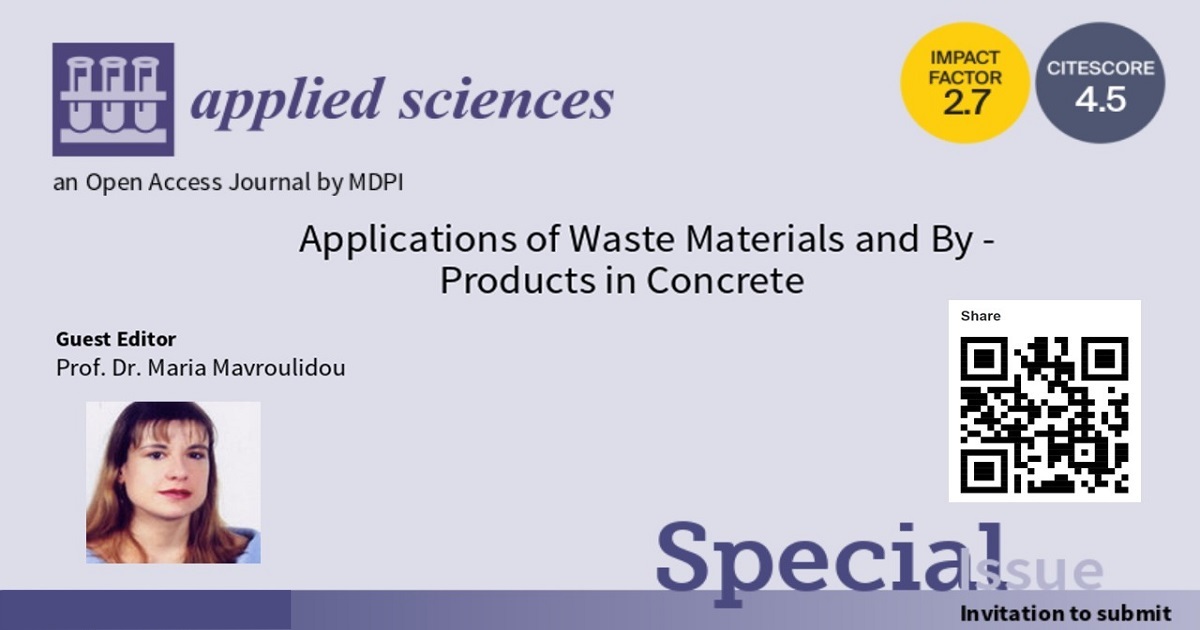Applications of Waste Materials and By-Products in Concrete
A special issue of Applied Sciences (ISSN 2076-3417). This special issue belongs to the section "Civil Engineering".
Deadline for manuscript submissions: 20 February 2025 | Viewed by 1532

Special Issue Editor
Interests: green concrete; alkali-activated cements; biocements
Special Issues, Collections and Topics in MDPI journals
Special Issue Information
Dear Colleagues,
Concrete is the most widely used building material worldwide and it is integral to modern life. However, its production can have a number of adverse environmental effects due to the use of nonrenewable natural materials or, if Portland cement is used, due to the high CO2 emissions in the cement production process. It comes as no surprise that nonhazardous waste materials and by-products, which would otherwise be mostly landfilled, have been proposed to be utilized in making concrete and similar construction materials, thus addressing the environmental impact and overall sustainability of concrete while also providing an outlet to reuse high quantities of waste materials and by-products.
This Special Issue invites papers that research the usage of waste materials or by-products in different types of concrete for various applications. Papers could study waste materials and by-products as concrete mix components, including water, coarse and fine aggregates, and cement or other binding agents, as well as admixtures or fibre reinforcements. Papers on the usage of waste or by-product materials in innovative concretes (for example, concretes with alkali-activated/geopolymer binders, polymeric binder concretes, and CO2-mixed/cured concrete or bioconcretes) are of interest. Material characterisation and modelling in addition to mechanical and durability testing, usage potential and sustainability assessments are also of relevance.
Prof. Dr. Maria Mavroulidou
Guest Editor
Manuscript Submission Information
Manuscripts should be submitted online at www.mdpi.com by registering and logging in to this website. Once you are registered, click here to go to the submission form. Manuscripts can be submitted until the deadline. All submissions that pass pre-check are peer-reviewed. Accepted papers will be published continuously in the journal (as soon as accepted) and will be listed together on the special issue website. Research articles, review articles as well as short communications are invited. For planned papers, a title and short abstract (about 100 words) can be sent to the Editorial Office for announcement on this website.
Submitted manuscripts should not have been published previously, nor be under consideration for publication elsewhere (except conference proceedings papers). All manuscripts are thoroughly refereed through a single-blind peer-review process. A guide for authors and other relevant information for submission of manuscripts is available on the Instructions for Authors page. Applied Sciences is an international peer-reviewed open access semimonthly journal published by MDPI.
Please visit the Instructions for Authors page before submitting a manuscript. The Article Processing Charge (APC) for publication in this open access journal is 2400 CHF (Swiss Francs). Submitted papers should be well formatted and use good English. Authors may use MDPI's English editing service prior to publication or during author revisions.
Keywords
- concrete
- waste materials and by-products
- mechanical behaviour and durability
- sustainability assessment
- material characterisation and modelling
- thermodynamic analysis
Benefits of Publishing in a Special Issue
- Ease of navigation: Grouping papers by topic helps scholars navigate broad scope journals more efficiently.
- Greater discoverability: Special Issues support the reach and impact of scientific research. Articles in Special Issues are more discoverable and cited more frequently.
- Expansion of research network: Special Issues facilitate connections among authors, fostering scientific collaborations.
- External promotion: Articles in Special Issues are often promoted through the journal's social media, increasing their visibility.
- e-Book format: Special Issues with more than 10 articles can be published as dedicated e-books, ensuring wide and rapid dissemination.
Further information on MDPI's Special Issue polices can be found here.





